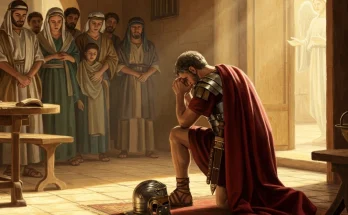Have you ever wondered why God’s grace seems to defy our sense of fairness? The parable of the workers in Matthew 20:1-16 challenges our expectations of equality and justice. In this story, a landowner hires workers at different times of the day but pays them all the same wage. At first glance, it might seem unfair, but Jesus uses this parable to reveal something profound: God’s grace is undeserved, limitless, and equally available to all.
As we study the parable of the workers, we’ll uncover how it reflects the generous nature of God. His Kingdom doesn’t operate on human terms but on His divine principles of grace and mercy. This story reminds us that no matter when or how we come to Him, His love and salvation remain constant.
Through this study, we’ll explore how this parable applies to our lives today. Together, we’ll wrestle with questions about fairness, gratitude, and trusting God’s plan. Let’s dive into this rich passage and discover how it can reshape our understanding of grace and inspire us to extend that grace to others. Are you ready to see the beauty of God’s generosity? Let’s begin!
Setting the Scene: The Context of Matthew 20
To understand the parable of the workers, we must explore its cultural and historical setting. Vineyards were common in ancient Israel, requiring seasonal laborers for the harvest. Landowners often hired workers daily, and wages were agreed upon upfront. This familiar practice set the stage for Jesus’ teaching.
In Matthew 19, just before the parable, the Apostle Peter asked Jesus what rewards awaited those who left everything to follow Him. Jesus assured them of great rewards but warned that “the first will be last, and the last will be first.” This parable directly illustrates that statement, showing that God’s rewards are based on grace, not merit.
By connecting the parable to Peter’s question, we see how Jesus addresses a universal struggle: comparing ourselves to others. Through the parable of the workers, Jesus shifts the focus from fairness to God’s generosity, reminding us that His grace transcends human expectations.
The Parable Explained: Key Elements
In the parable of the workers, the landowner represents God, who holds complete authority over salvation and the Kingdom of Heaven. The landowner’s actions are deliberate, illustrating God’s sovereign control. He hires workers throughout the day, reflecting His relentless pursuit of humanity. Each invitation to work symbolizes God’s call to salvation, extended to all, regardless of the hour. This challenges us to trust in His timing and recognize His generosity as a reflection of His character.
The Workers
The workers symbolize humanity, representing both those who follow God early in life and those who respond later. Some workers are hired at dawn, while others join throughout the day. Despite their differences in timing, they all depend on the landowner’s offer. This highlights that salvation is not about when we come to God but about answering His call. The parable reminds us that no one is excluded from God’s grace.
The Wages
The wages in the parable of the workers represent eternal life and the boundless grace of God. Importantly, these wages are not earned through labor but are given by the landowner. This demonstrates that salvation is a gift, not a reward for effort. As Ephesians 2:8-9 teaches, we are saved by grace through faith, not by works. By giving the same wage to all workers, Jesus emphasizes that God’s grace is not dependent on human achievement.
The Equal Pay
Equal pay challenges our human ideas of fairness and merit. From a worldly perspective, the workers hired first deserve more than those who worked only an hour. However, the landowner reminds them that he is free to give as he chooses. This reveals a deeper truth: God’s grace is not about earning but about His generosity. The parable of the workers invites us to celebrate God’s goodness rather than compare ourselves to others.
Through these key elements, Jesus shifts our focus from merit to grace, reminding us that salvation is a gift for all. The parable of the workers challenges us to embrace God’s generosity and reflect it in our own lives.
Grace vs. Fairness: The Heart of the Parable
The parable of the workers confronts our natural sense of fairness, contrasting it with the boundless grace of God. In human terms, fairness is about receiving rewards based on effort or merit. We often expect those who work harder or longer to receive greater compensation. However, this parable flips that idea, showing that God’s Kingdom operates on grace, not merit. The landowner’s choice to give each worker the same wage reveals God’s sovereignty in salvation. He alone decides how His grace is distributed, and it is not bound by human expectations.
This parable illustrates that God’s grace is unearned and undeserved. The workers hired late in the day could not possibly earn the full wage in such a short time, yet they received it anyway. Similarly, Ephesians 2:8-9 reminds us that we are saved by grace through faith, not by works. No one can boast about earning their way into God’s favor.
Through this story, Jesus teaches us that God’s grace is a gift, freely given to all who accept His call. While fairness might seem logical, grace is far greater. The parable of the workers invites us to trust in God’s generosity and celebrate His unmerited favor rather than question His fairness.
Lessons for Today: God’s Grace for All
The parable of the workers teaches us that God’s grace is available to everyone, no matter when they respond to His call. Whether someone follows God from a young age or turns to Him later in life, His grace remains constant. This truth should bring joy to our hearts and eliminate any feelings of comparison or jealousy. Instead of begrudging God’s generosity toward others, we are called to celebrate it.
This parable challenges believers to shift their focus from fairness to gratitude. It’s easy to feel entitled when we’ve served God faithfully for years, but this story reminds us that everything we receive is a gift of grace. No one earns salvation; it is entirely the result of God’s goodness. When we understand this, we can let go of resentment and embrace a spirit of thankfulness.
Additionally, the parable of the workers inspires us to extend grace to others. Just as God welcomes latecomers into His Kingdom, we should also show patience and love toward those who are still on their journey of faith. By reflecting God’s generosity, we can encourage others to accept His call, regardless of where they are in life.
Ultimately, this parable reminds us that God’s Kingdom is not about competition but about community. It’s a place where everyone can experience the beauty of God’s grace, no matter when they arrive.
Final Insights on the Parable of the Workers
The parable of the workers teaches us that God’s grace is freely given and available to all, regardless of timing or effort. It challenges us to let go of comparisons and embrace the truth that salvation cannot be earned. Instead of focusing on fairness, we are called to celebrate God’s generosity and reflect it in our lives.
Take time to reflect on how this parable applies to your faith journey. Are you rejoicing in God’s grace, or are you tempted to compare your blessings with others? Trust that God’s plan is perfect and His generosity limitless.
Let this story inspire you to share God’s grace with others. Just as the landowner invited all to his vineyard, we are called to invite others into God’s Kingdom. Celebrate His boundless grace and extend it freely, knowing it’s a gift for everyone.
Frequently Asked Questions (FAQ) About the Parable of the Workers
1. What is the main message of the parable of the workers? The main message is that God’s grace is unearned and freely given to all, regardless of when they respond to His call. It emphasizes His generosity and challenges our human notions of fairness, reminding us that salvation is a gift, not a reward.
2. Why did all the workers receive the same wage? In the parable, the equal wages symbolize God’s grace and salvation, which are not based on effort but on His sovereign generosity. This shows that all believers, regardless of when they come to faith, receive the same eternal reward.
3. How does this parable apply to our lives today? The parable teaches us to celebrate God’s grace without comparison or jealousy. It calls us to trust His timing, rejoice in His generosity, and extend grace to others in our daily lives.



